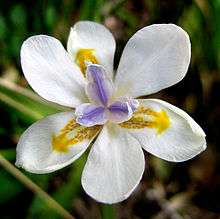Dietes iridioides
Dietes iridioides, commonly named African iris, fortnight lily, and morea iris, is a species of plant in the family Iridaceae. It has white flowers marked with yellow and violet, with six free tepals that are not joined into a tube at their bases. These flowers last only one day. The seedpods of the plant often bend the stalks down to the ground where they have a better chance of propagating a new generation of plants.
| Dietes iridioides | |
|---|---|
 | |
| Scientific classification | |
| Kingdom: | Plantae |
| Clade: | Tracheophytes |
| Clade: | Angiosperms |
| Clade: | Monocots |
| Order: | Asparagales |
| Family: | Iridaceae |
| Genus: | Dietes |
| Species: | D. iridioides |
| Binomial name | |
| Dietes iridioides | |
| Synonyms | |
|
Dietes vegeta N.E.Br. | |
The very similar Dietes grandiflora is a larger plant, which can be distinguished by larger flowers which have dark spots at the base of the outer tepals, and last for three days.
Dietes iridoides is widely distributed in Africa, from Ethiopia to South Africa.[1]
These plants were formerly placed in the genus Moraea, but were reclassified because they are rhizomatous. Some references mention the species Dietes vegeta or D. vegeta variegata, springing from some confusion with Moraea vegata (which grows from a corm, not a rhizome). The name D. vegeta is commonly misapplied to both D. iridioides and D. grandiflora.
References
- "Dietes iridoides". World Checklist of Selected Plant Families. Royal Botanic Gardens, Kew. Retrieved 2015-08-10.
- Pink, A. (2004). Gardening for the Million. Project Gutenberg Literary Archive Foundation.
External links
- Dietes iridioides photo